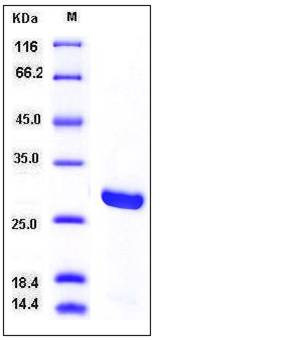Human GSTM2 / GST4 Protein (His Tag)
GST4,GSTM,GSTM2-2,GTHMUS
- 100ug (NPP2173) Please inquiry
| Catalog Number | P12042-H07E |
|---|---|
| Organism Species | Human |
| Host | E. coli |
| Synonyms | GST4,GSTM,GSTM2-2,GTHMUS |
| Molecular Weight | The recombinant human GSTM2 consisting of 229 amino acids and has a calculated molecular mass of 27.2 kDa. It migrates as a 27 kDa band in SDS-PAGE under reducing conditions as predicted. |
| predicted N | Met |
| SDS-PAGE |  |
| Purity | > 97 % as determined by SDS-PAGE |
| Protein Construction | A DNA sequence encoding the native human GSTM2 (P28161) (Met 1-Lys 218) was expressed, with a polyhistide tag at the N-terminus. |
| Bio-activity | |
| Research Area | Immunology |Signal Transduction |Metabolism |Drug metabolism |
| Formulation | Lyophilized from sterile 50mM Tris, 150mM NaCl, 10mM CaCl2, 0.05% Brig-35, pH 7.5 1. Normally 5 % - 8 % trehalose, mannitol and 0.01% Tween80 are added as protectants before lyophilization. Specific concentrations are included in the hardcopy of COA. |
| Background | Glutathione S-transferase Mu 2, also known as GST class-mu 2, GSTM2-2 and GSTM2, is a cytoplasm protein which belongs to the GST superfamily and Mu family. GSTM2 / GST4 contains one GST C-terminal domain and one GST N-terminal domain. The glutathione S-transferases (GSTs) are a multigene family of enzymes largely involved in the detoxification of chemicals. Eight distinct classes of the soluble cytoplasmic mammalian glutathione S-transferases have been identified: alpha, kappa, mu, omega, pi, sigma, theta and zeta. Butyrate, an important luminal component produced from fermentation of dietary fibers, is an efficient inducer of GSTs and especially of GSTM2. Butyrate may act chemoprotectively by increasing detoxification capabilities in the colon mucosa. |
| Reference |
